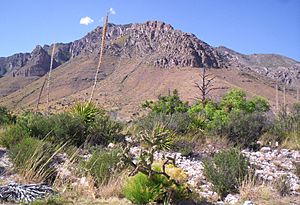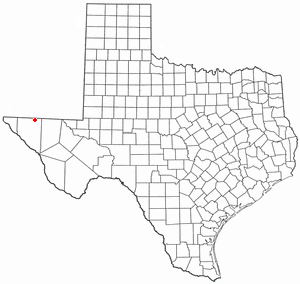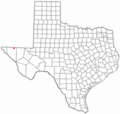Paulville facts for kids

Paulville, Texas, was a planned community in the salt flats of north Hudspeth County, Texas. It was meant to be a place where only supporters of Ron Paul, a U.S. Congressman, would live. The community was named after him. It started in January 2008 because Ron Paul became very popular during his 2008 election campaign. The idea for Paulville was based on Paul's libertarian ideas, which focus on individual freedom. However, the community was never built, and the organization behind it is no longer active.
Contents
Where Was Paulville?

The land chosen for Paulville was in undeveloped salt flats. It was outside any city, located south of Dell City, Texas, a small town with about 365 people. The site was north of U.S. Route 180 and about an hour's drive east of El Paso. It was also about 770 kilometers (480 miles) from Ron Paul's office in Lake Jackson.
The organizers said they had bought 50 acres (20 hectares) of land. Pictures of the area show the Guadalupe Mountains about 15 kilometers (9 miles) to the east. The local area has some deer and tumbleweeds. The mountains are also home to animals like elk, coyotes, jack rabbits, desert cottontails, and gray foxes. Another mountain range is just to the west.
The site is located in Texas's 23rd Congressional district. This area is currently represented by Republican Tony Gonzales.
How Paulville Was Organized
The land for Paulville became available when its first owner sold it on eBay. The group behind the community was also called "Paulville.org," named after its website. This website is now inactive. The organization was started on January 27, 2008, by Jason Ebacher, who organized Ron Paul fan meetings in Farwell, Minnesota.
Paulville was set up as a cooperative of shareholders. This means people bought shares and worked together. They held their first meeting in April 2008. These shareholders would vote on important things like water and electricity for the community. Jason Ebacher made a video about the idea for Paulville before the land was bought. This video was shown on Ron Paul Television. On May 12, 2008, the Paulville.org website stopped working. Since then, the website and the organization have remained inactive.
Plans for Paulville
The people planning Paulville wanted to set up systems for waste (septic) and electricity. They planned for these systems to be optional. This meant that people living there would not have to use the cooperative's water and energy. They could choose to live "off-grid," meaning they would get their own power and water. Members said they chose the West Texas location because it gets a lot of sunshine, which is good for solar panels.
The organizers warned that buying land and building a home from scratch would be a lot of work. It was "not for the faint of heart." In his video, Ebacher talked about how easy it would be to raise sheep and chickens. He also discussed using energy from solar power, wind, water, and biodiesel fuels. Members also thought about how they would get things like cell phones and internet connections. However, almost none of these plans were ever built. The land remains empty and nobody lives there as of 2021.
The idea was to create a private community without many building rules. They even thought about creating more communities like this in other states. The idea of people with similar beliefs forming their own community has been tried before. Examples include the Free State Project in New Hampshire and New Australia in Paraguay. Communities based on shared ideas have ranged from communism to environmentalism. Jonathan Dawson, an educator, wondered if these small, inward-focused communities were helpful. But he also said they could "provide an example" to others.
What People Thought About Paulville
Paulville was chosen by and for "100% Ron Paul supporters" and people who believed in freedom. Many followers of Ron Paul were very dedicated. Paulville received different opinions. Some people thought it was a good idea for those who believed in Ron Paul's ideas of freedom. Others, like the Lone Star Times newspaper, joked about the founders, calling them "Paulvillains" and saying they were creating "an insane asylum." Some wondered if it would be a perfect place or a "hilarious catastrophe."
Ron Paul himself had mixed feelings about Paulville. He said, "You want to spread out and be as pervasive as possible." He didn't see Paulville as the main solution, but he thought it "can't hurt anything either." He believed it showed "how desperate people are for freedom." He found the idea of more such communities amusing, but he wasn't sure how much they would achieve.
Andrew Sullivan from the Atlantic magazine said, "Who wants to live around people who agree with you on everything?" He felt that wasn't his idea of freedom. The Libertarian Party of Texas thought Paulville had the potential to show how libertarianism could work in real life.
Images for kids
-
One view of the local Guadalupe Mountains.
-
Location of nearby Dell City, Texas.
 | Anna J. Cooper |
 | Mary McLeod Bethune |
 | Lillie Mae Bradford |



